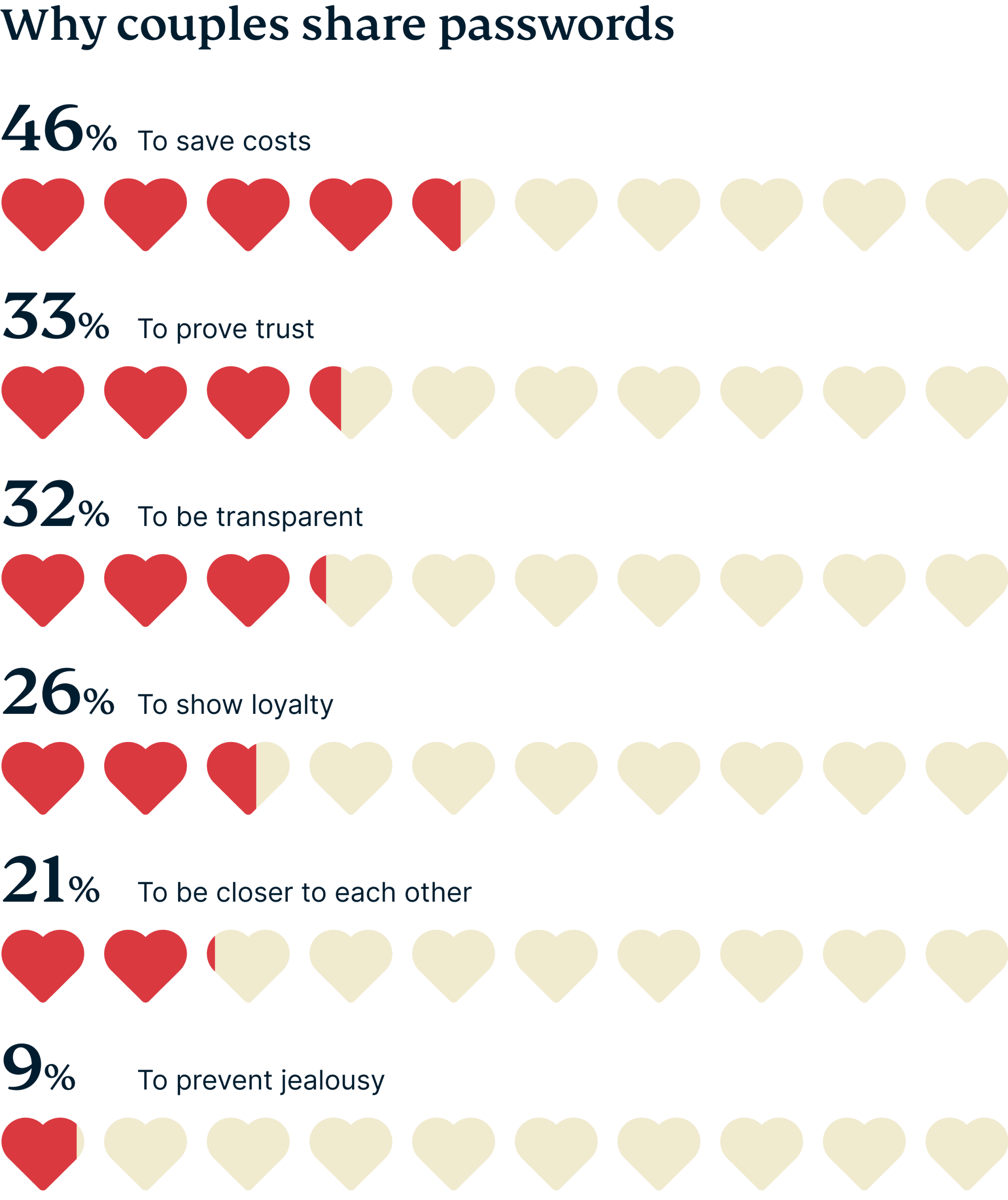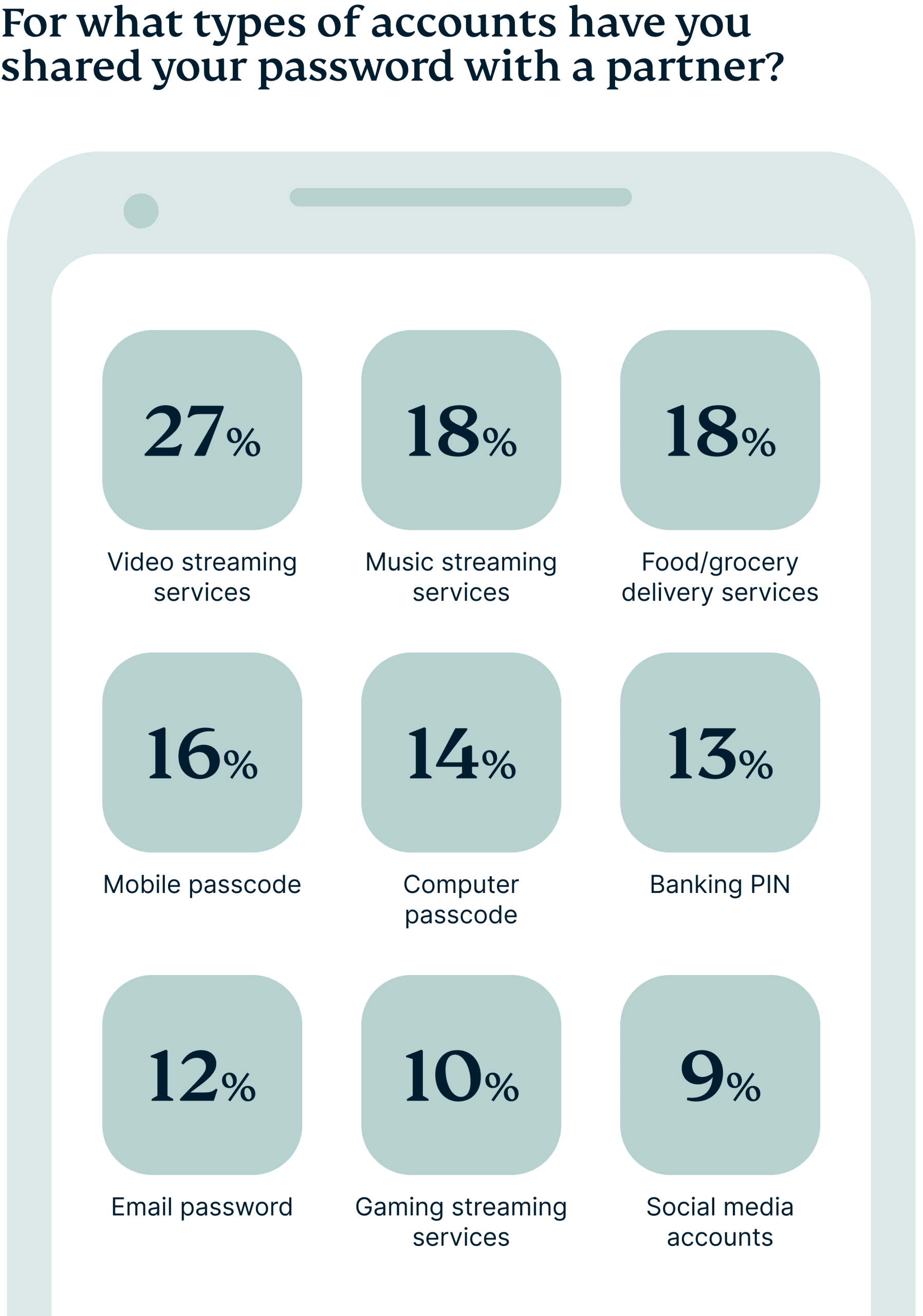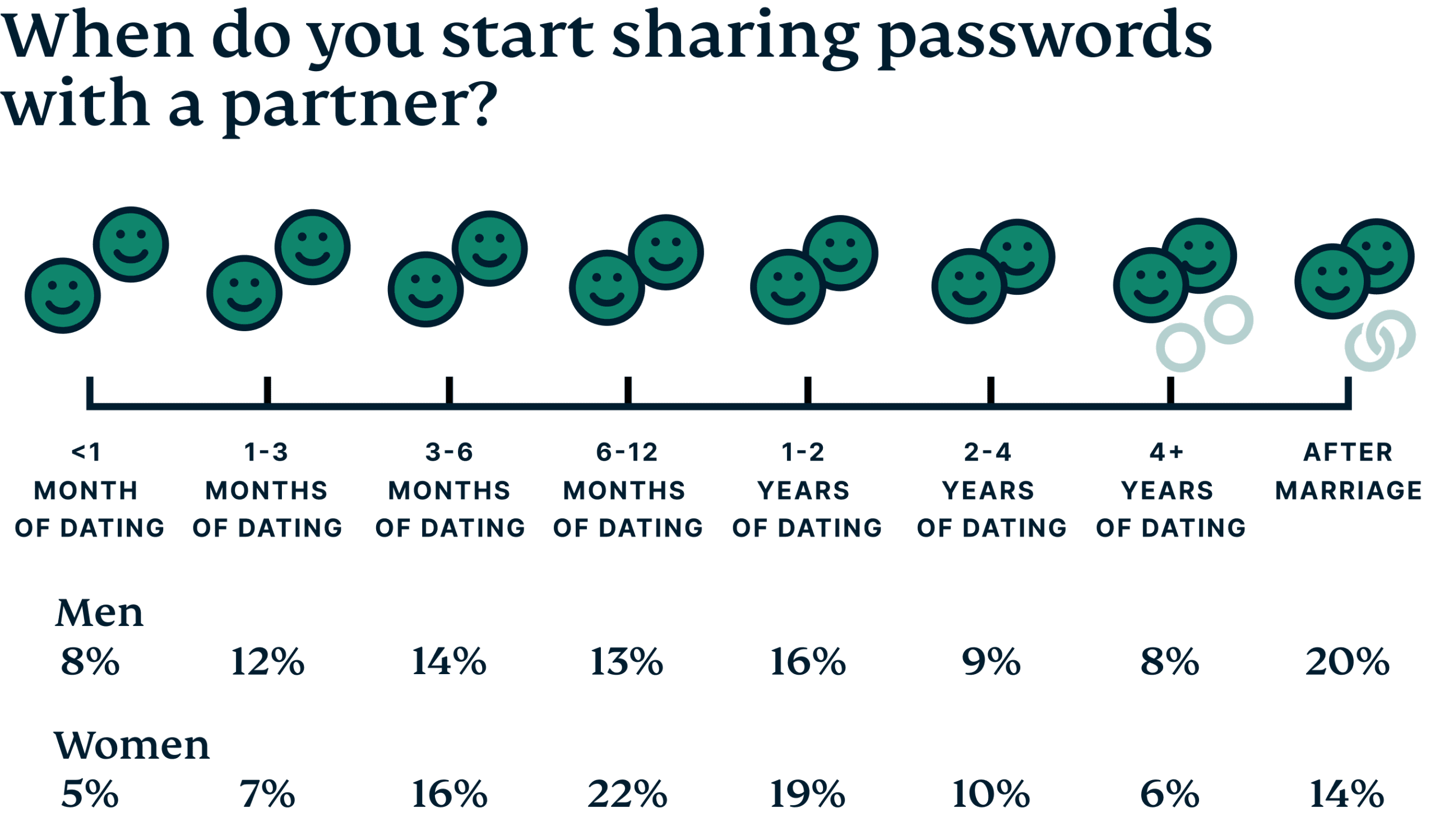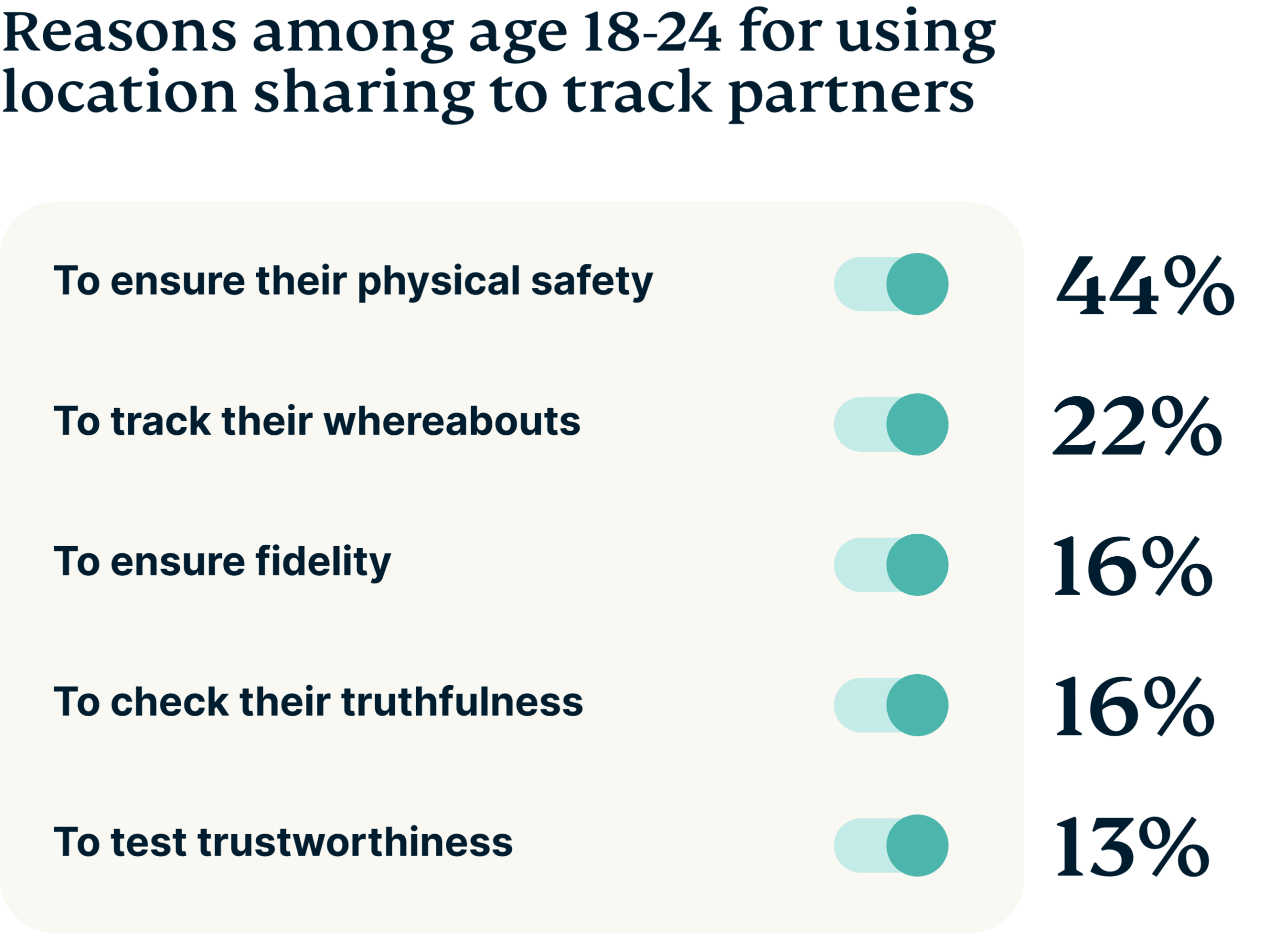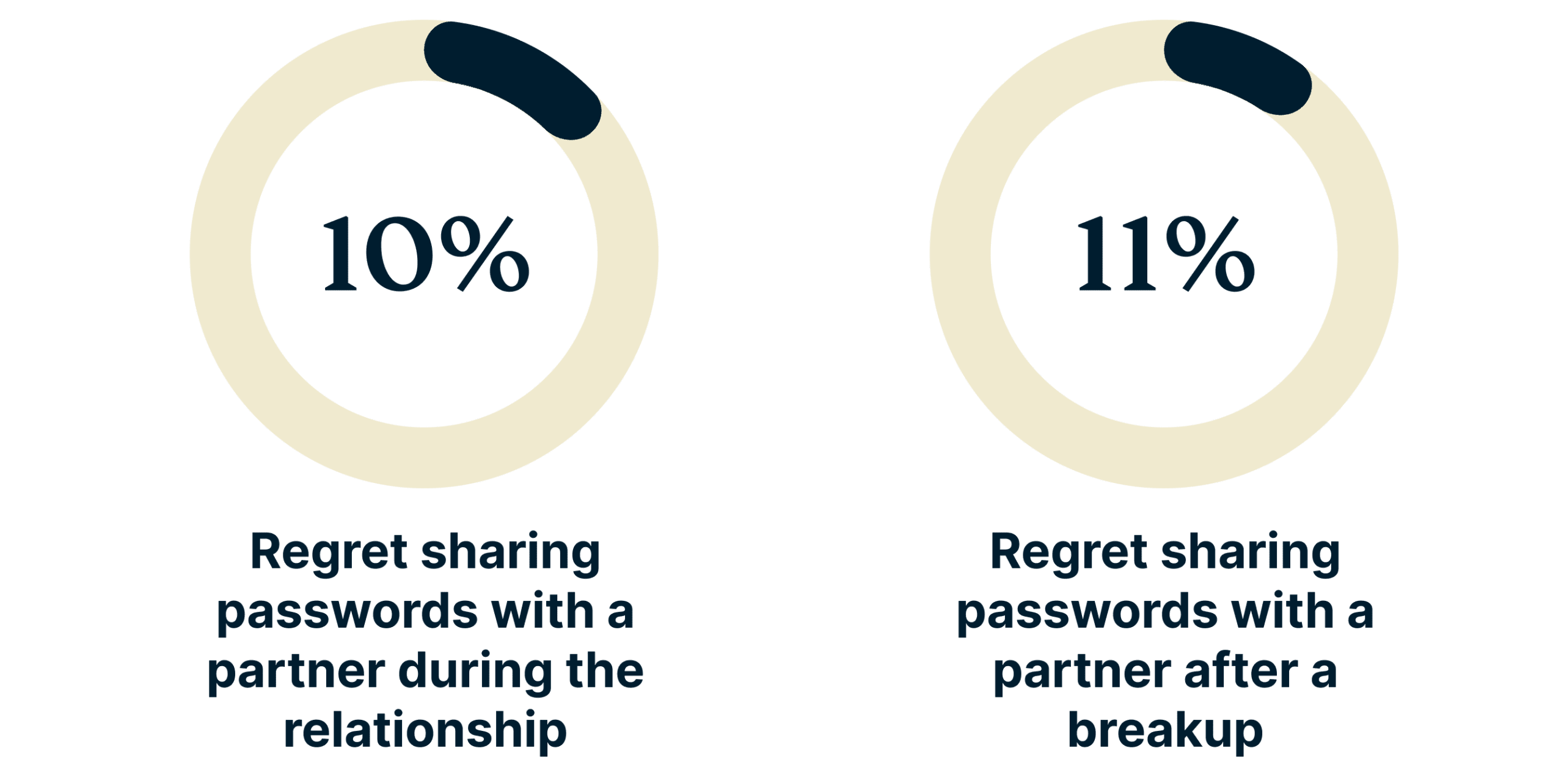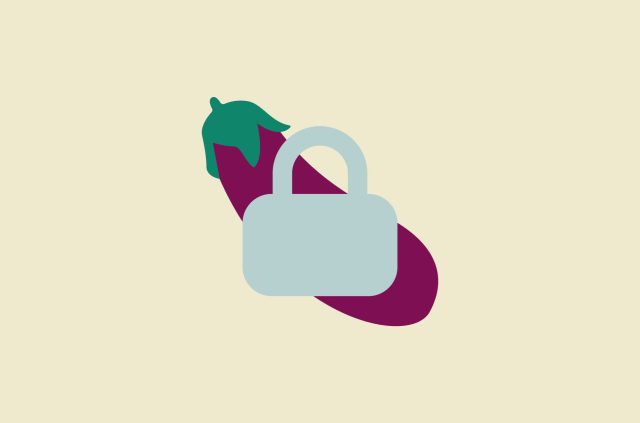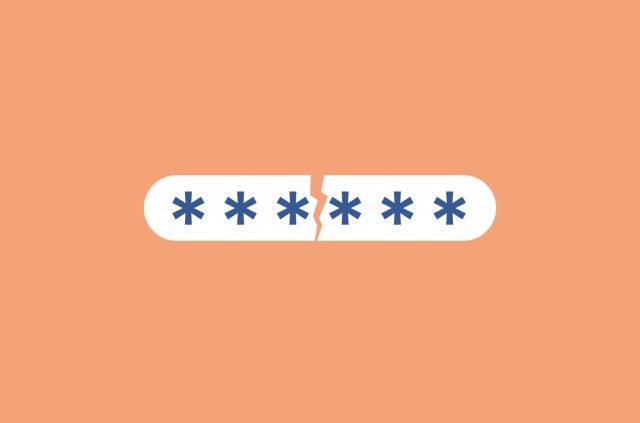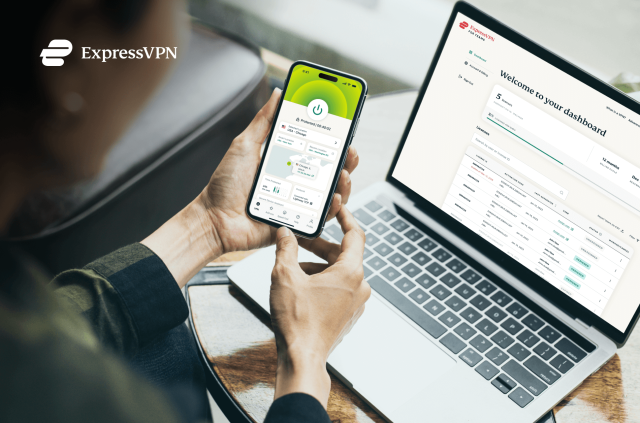UK survey: 71% have shared passwords with romantic partners



First comes love, then comes… password sharing? It’s a fact of relationships in the digital age: Most couples divulge login details to each other, often for convenience, but they also say that doing so is a sign of trust and loyalty.
To explore the types of information people are putting at risk by sharing passwords with their partners and their attitudes about the practice, ExpressVPN surveyed 2,000 men and women in relationships across the UK. Here’s what we found.
Couples share passwords to save money and signal trust
Some couples share everything, from money to cars and even toothbrushes. According to our research, the sharing doesn’t stop there. A huge 71% of Brits say they have shared a digital password with their significant other, bringing a new meaning to “what’s mine is yours.”
The reasons for sharing passwords vary, but the most common one is pragmatic—to save money. Other reasons involve improving the relationship, such as displaying transparency or trust. Perhaps most worrying, 9% have even shared passwords to prevent jealousy.
When it comes to the types of passwords couples are sharing, there are some clear frontrunners. The most popular passwords shared between couples are for video streaming services—think Netflix or Amazon Prime—as well as music streaming services like Spotify. Admittedly, sharing one’s streaming account password poses a relatively low risk and is in fact expected, given that some accounts are meant for multiple users. Incredibly, 16% of Brits also share their mobile passcode with their partner giving access to almost all apps, data, photos and videos on their device and a huge wealth of personal and sensitive information.
What’s the right time to share your passwords?
Every couple progresses their relationship at a different speed, and the same can be said for password sharing. Brits most commonly wait until they have been together for 6-12 months before sharing their passwords. The research found that women are more likely to share their passwords over all, but only after a certain time. Men are quicker to share, and it’s often in the first three months of dating.
Women don’t share passwords as freely in the very early stages of a relationship, but overtake men significantly in the later parts of the first year of dating.
What does password sharing say about a relationship? It’s clear that there’s much more than convenience at play. The vast majority of respondents believe a significant other’s willingness to share passwords is indicative of trust (86%), honesty (85%), commitment (82%), and, yes, even marriage material (78%).
The risks of not sharing? Partners fear relationship woes
According to our survey, 31% of people fear that not sharing passwords with their partner will make them look like they have something to hide. In fact, 23% feel they need to share passwords to prove loyalty, and 21% have felt pressured to share.
Understandably, not everyone is eager to share their passwords. The main reasons for hesitancy are that people use the same password for multiple online accounts or want to keep their digital information private in case of a breakup.
| Reasons people don't share passwords |
|
| I use the same password for other online accounts | 44% |
| I want to keep my digital information private in case of a breakup | 21% |
| I fear my significant other will be tempted to use my logins to check in on me | 12% |
| I don't trust my significant other to not take advantage of my digital privacy | 12% |
| I don’t want my significant other to see what I am up to | 8% |
The fact is, the risks of sharing passwords with your partner goes beyond your relationship. Our research found that 8% of respondents have shared someone else’s login without their consent and 16% have had their own login information shared without agreeing to it.
Location sharing is widely used among young couples
Location sharing is a phone function users can set up that allows you to track the location of another phone. It is commonly used by parents to check on their children, for instance.
In the UK, 44% of people in a relationship use location sharing with their significant other. Younger generations are far more likely to use location sharing compared with older age groups. Our survey shows that 78% of 18-24 year-olds use location sharing with their partner, but this figure decreases steadily with age, hitting 55% among 25-34 year olds, 46% of 35-44 year olds, 32% of 45-54 year olds, 24% 55-64 year olds, and 15% for those 65+.
While in most cases, the partner being tracked knows it is happening, 32% of our youngest respondents (age 18-24) say they have turned on location sharing without someone’s knowledge. Alarmingly, they are more likely to track an ex-partner without their knowledge via location sharing than a current partner, and 27% have caught a partner in a lie. A third of this age group have also used technology (such as social media) to stage a seemingly coincidental meeting with someone they fancy.
1/3 of the 18-24 age group have used technology (such as social media) to stage a seemingly coincidental meeting with someone they fancy.
It is a positive finding, though, that a large segment of 18-to-24-year-olds claim they use location sharing with their partner to ensure physical safety rather than just stalking for reassurance about the relationship.
It can be hard to get over your ex’s accounts
Let’s be real, breakups are never easy (especially when it comes to losing your ex’s Netflix account!). But if you’ve gone to the lengths of sharing your passwords and online information with your ex, the process of snuffing out that old flame has to be a digital cleanup and password reset exercise. If not, you may regret it.
What are the risks after a breakup? Some decide to use their ex’s online accounts even after the end has come, with a whopping 35% admitting to using their ex’s Netflix login after the relationship has run its course. More surprising, perhaps, is 36% have used their ex’s Facebook login and 28% have used their ex’s email login post-breakup.
| Which accounts have you accessed with an ex’s login? | |
| Netflix | 36% |
| 35% | |
| 28% | |
| TikTok | 21% |
| 21% | |
| Snapchat | 17% |
| Apple ID | 16% |
| Computer passcode | 15% |
| Mobile passcode | 13% |
| Location-sharing | 12% |
| Banking PIN | 11% |
| Credit card login | 10% |
Alarmingly, 27% of Brits go as far as using tech (including social media and financial platforms) to digitally track their ex’s activity post-breakup.
How to protect your accounts after a breakup
Based on our overall data, many seem to prefer to take the risk of sharing passwords for the relationship benefits. But this decision should be considered carefully, and action should be taken if the relationship ends.
“We all have a right to feel secure in our own digital space, and sharing passwords with those closest to us, like partners or friends, can be an act of trust and loyalty,” said Lauren Hendry Parsons, privacy advocate at ExpressVPN. “However, when we share passwords it can put the security of our accounts at risk—not only just the single account with that password, but potentially any other accounts using similar passwords as well. That’s why it’s so important to make sure you’re taking the necessary steps to protect your digital privacy should things not work out.”
We asked respondents what actions they take to sever digital ties after the end of a relationship. Changing passwords was the most common act, followed by unfollowing the person on social media and even blocking them.
| How do you cut digital ties after a breakup? | |
| I unfollow my ex on social media | 25% |
| I change my passwords immediately | 22% |
| I erase my ex’s contact information from my phone | 19% |
| I block my ex on social media | 19% |
| I block my ex’s phone number | 16% |
| I log out of all my devices | 14% |
| I do not cut digital ties after a breakup | 11% |
5 things to do after a breakup
1. Unlink GPS tracking services
Some phone service providers set up location-tracking services for joint phone accounts under its family plan. If you’re sharing your account with an ex, close the account or transfer ownership after removing yourself. Additionally, if you’ve used location-tracking apps or hardware devices like Apple’s AirTag, remember to unlink them.
2. Change your passwords
Reset any passwords your partner might have known. It’s always a good idea to use a password manager and to randomly generate strong passwords. While you’re at it, enable two-factor authentication (2FA) wherever possible, which prevents anyone from accessing your account even if they know your password.
3. Reset smart devices
If you have shared devices in your home, such as computers, security cameras, and Wi-Fi routers, it would be a good idea to reset them so your ex no longer has access.
4. Unlink shared streaming accounts
While there isn’t usually much harm in your ex knowing the songs, movies, or podcasts you watch or listen to, it’s still a good idea to protect your privacy as much as you can.
5. Wipe your search history and remove saved passwords on browsers
If your ex gets to keep formerly shared devices after the breakup, clear your search history and remove downloaded files and documents as relevant. More important, clear personal passwords and other information like credit card details that have been saved in your browser as well.
Read more: After a breakup: Tips to sever your digital ties
Take the first step to protect yourself online. Try ExpressVPN risk-free.
Get ExpressVPN